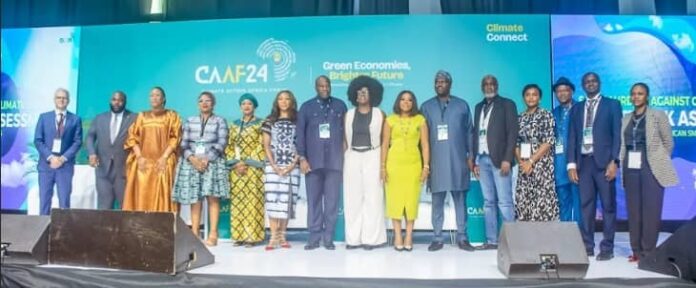…experts advocate urgent collaborative action to address effects of climate change in Africa
CHIGOZIE AMADI
With the drastic rise in global warming, concerns have been tuned toward Africa as experts call for collaborative efforts in mitigating the effects of climate change in the continent.
The need for all to take responsibility to safeguard the future climate was emphasised at the Climate Action Africa Forum 24 (CAAF24) where stakeholders from across the world converged. The laudable event was organised by Climate Action Africa (CAA) with the theme— greener economies, brighter future.
In her address, during the opening plenary on Wednesday at Landmark center, Lagos, the executive director of CAA, Grace Oluchi Mbah, pointed out that Africa is warming nearly faster than other regions, with 130 million people at risk from rising sea levels which will affect farmers, food production and livelihood.
As part of measures to address the unpleasant climate change effects, Mbah announced the launch of CAA’s Billion Trees for Africa Initiative under its community programmes to address environmental degradation and enhance the ecological and economic resilience of African communities.
She also unveiled the new Pan-African Green Economy Program (PAGE), established in partnership with IDEA AFRICA and the Founder Institute with with aim of providing support to 5,000 innovators across the continent by 2035.
The forum convener reaffirmed the organisation’s commitment to nurturing innovators and climate solutions.
“We choose to push ourselves continually, to innovate, and invest in the future we want for Africa. A future that is sustainable, green, prosperous and harmonious with nature. That is the story of Africa we choose to write.
“Recognising the critical role of investment in climate action, we are proud to support the Pan African Climate Action Fund. A $20 million initial investment fund, co-created by dedicated Africans, which seeks to empower small growing businesses and startups in the energy, agriculture, circularity and transportation sector,” Mbah said.
The keynote speaker, Ramatoulaye Diallo Ndiaye, ex-Minister of Culture in Mali and founder of Great Green Wall of Africa (GGWoA) Foundation, noted that Africa is facing an extreme weather event.
Ndiaye called for an urgent address of Africa’s climate change, saying that the development of Africa leads to the development of the entire world.
In her remark, Dr Titilayo Oshodi, the Special Adviser to the Lagos State Governor on climate change and circular economy, urged stakeholders to act decisively for a better future.
She assured that the state government is prioritising the well being of the people and taking deliberate measures to protect their environment through its initiatives and policies.
On his part, Engr. Michael Oluwagbemi, Program Director of Presidential CNG Initiative (Pi-CNG) enjoined Nigerians to embrace the use of gas to achieve a gas economy.
Oluwagbemi said, “with gas, you can drive the transportation sector, industrial sector, agriculture and productivity as some countries have adopted the use of natural gas.”
Other speakers at the event were— Rukia El Rufia, Special Advisor the president of the federal republic of Nigeria on NEC and Climate Change; Mr. Markus Wauschkuhn, Cluster Coordinator for the Sustainable Economic Development Cluster of GIZ Nigeria and ECOWAS;
Mr President Professor Benedict Oramah represented by Ms Helen Brume, Director of Project and Asset Based Finance Afrexim Bank and more.
Part of the remarkable highlights of the CAAF24 was the exhibition of various creative household items crafted with waste products by children. The winners of the Climate Champion Quest organised by STEAM Funfest were—Praise Omoniyi and Praise Friday (1st position), Treasure Nwosu (2nd position) and Alabi Abimbola (3rd position).
There were breakout sessions for panel discussions and workshops that focused on key issues such as the potential of forests and carbon credits, climate financing, Nigeria’s carbon market activation, mobilizing private capital for climate-positive investments in Africa, building resilient and livable African cities amongst others.

























